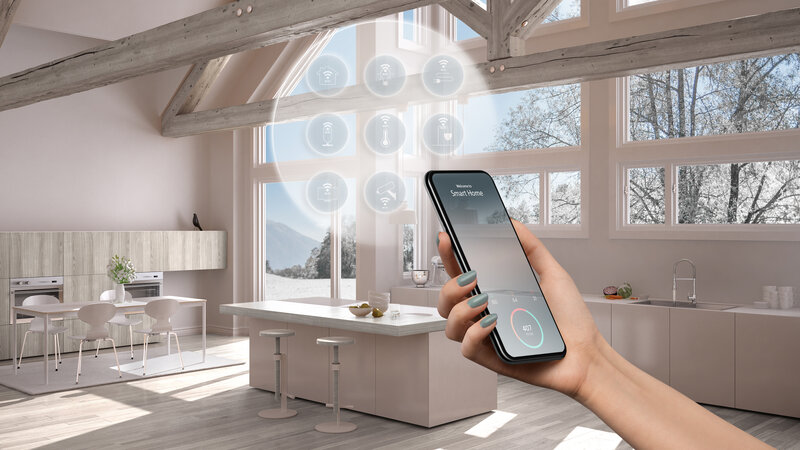
If you’ve ever used a voice assistant to adjust your home’s thermostat or turn on the lights, you already know just how useful smart home devices can be. But what if instead of simply responding to voice commands, those assistants could predict your behavior and automatically anticipate what you need?
It may sound like something from the future, but artificial intelligence in home automation is already here, and it’s only going to get better as technology advances. AI-powered smart technologies promise to personalize the smart home market, automatically adjust various devices to meet your preferences and make your daily life easier than ever before.
What Exactly Is Artificial Intelligence (AI)?
Artificial intelligence systems work by training themselves on a massive amount of data in a process called machine learning. If you’ve tried a tool like ChatGPT and wondered how it can respond to you in such a human-like way, machine learning algorithms are the answer.
AI-based Internet of Things (IoT) devices analyze data and train themselves on several different cognitive skills, including:
Learning: The AI acquires raw data and makes rules for how to turn data collected into actionable information. These rules, called algorithms, give different devices step-by-step instructions for completing daily tasks.
Creativity: The AI uses neural networks, statistics, and rule-based systems to come up with brand-new ideas, stories, images, and even music. For example, Google’s Bard can write entire novels of any genre, from romance to science fiction.
Reasoning: The AI must know how to choose the right algorithm for the job.
Self-correction: The AI continually adjusts its algorithms to provide increasingly accurate responses.
AI smart home devices can be classified as either weak or strong. Today’s virtual assistants, such as Amazon Alexa and Apple’s Siri, use weak AI. They simply respond to a user’s voice commands rather than making decisions of their own.
Strong AI, on the other hand, works more similarly to a human brain thanks to a concept called fuzzy logic. When strong AI devices encounter a problem they haven’t dealt with before, they can use fuzzy logic to come up with a solution. Most devices for smart homes aren’t on this level yet, but smart home technology is advancing rapidly.
Perks Of Artificial Intelligence In Home Automation
Why consider AI-based smart home devices? In short, artificial intelligence in home automation can make life easier, safer, and more convenient. Instead of telling smart thermostats that you want to turn on the air conditioning, for example, an AI-based system detects what time you come home from work and turns the A/C on automatically.
- Compared to regular smart homes without AI, AI-based smart homes and home automation:
- Provide advanced security features for your peace of mind
- Can be customized and personalized to your preferences and those of other people in the home
- Have advanced security features, such as protecting your home from potential security threats when you’re away at work
- Can help you cut down on energy consumption and save money on pricey electric bills for your smart home
- Can give you more efficient control over your life
How AI Integrates With Home Automation Systems
AI may sound like something out of a science-fiction novel, but the technology is making rapid strides to become smarter every day. Here’s how you can expect AI to integrate with your home automation system and its interconnected devices in the near future.
AI-based home security systems
Leaving home for a vacation can be a nerve-wracking affair. Did you remember to lock the windows and doors? What happens if a burglar breaks in and the neighbors don’t notice?
Enter AI-based home security systems, which are smart enough to recognize suspicious activity and send alerts over Wi-Fi if they identify potential threats. For instance, AI smart cameras can use motion sensors and facial recognition to flag people who don’t belong on your property with nearly zero false alarms. Some home security cameras even use night vision to ID intruders in the dark.
You may already have AI-based smart locks installed for your front door. These locks only let specific people into your smart home, and many can even automatically unlock them as you approach the door. You can also give guests remote access when you’re away from home.
AI-based climate control and energy efficiency
Is your energy consumption through the roof because you keep forgetting to adjust the thermostat? An AI-powered home device can learn from user behavior and automatically turn off the air conditioner when you leave for work or school.
AI-based windows can also automatically lower the shades when it’s hot outside for increased energy efficiency. Smart plugs let you turn devices on and off from your phone.
These linked devices could potentially save you hundreds of dollars on your electric bills. In fact, by implementing smart climate control in your home, you could cut your energy bills by up to 25% per year.
AI smart assistants in the kitchen
If you don’t feel like cooking after a long, tiring day, why not let smart home robot chefs come to the rescue? These robots can suggest dishes based on items in your fridge, adapt to your tastes and dietary preferences, and even cook full meals. We’re still a long way off from having robot chefs in every kitchen, but one day, these time-saving bots may be reliable and affordable enough for the average person.
Other smart home devices you may find in a smart kitchen include smart ovens and smart refrigerators. A smart oven can automatically turn off when a meal is done cooking, and you can also adjust the temperature from wherever you are via your phone. Smart fridges take inventory of the food inside and can alert you when you’re running low on ingredients.
Artificial intelligence in home automation for lawns and gardens
You’ve heard of robot vacuums, but what about robotic lawnmowers? Smart mowers automatically detect your lawn’s boundaries, recharge themselves, and can even go into sleep mode when it rains.
AI can also help if you’ve got a black thumb in the garden. AI-powered irrigation systems detect the optimal amount of water for specific plants and only water when necessary.
AI smart devices for people with disabilities
AI has shown promise as a safety tool for the elderly and disabled. These devices can detect smoke, unhealthy heat levels, and home intrusions, then notify loved ones or emergency personnel.
Wearable AI devices can also notify emergency workers if a person falls or goes unconscious, potentially saving their life.
AI integration between smart home systems and city infrastructure
Smart city infrastructure is still a ways off, but in the future, it could interface with smart homes to help people plan better routes and avoid time-sucking traffic jams.
Challenges Of Artificial Intelligence In Home Automation
There’s a lot to love about smart home technology, but it does have a few challenges to consider, including the following:
- AI in smart homes may discriminate against certain people if the algorithms aren’t properly trained.
- A smart home automation system handles sensitive information. Some people may be uncomfortable with the level of control such a system has over their life.
- Without frequent updates, smart home devices won’t run properly.
Contact Full Spectrum Technology Group To Learn More About Home Automation
Ready to put artificial intelligence in home automation to work for you? Full Spectrum Technology Group offers automated lighting, shading, and other home automation tools to make your life easier and more comfortable.
To learn about our solutions, contact us at (925) 815-8324 today.
